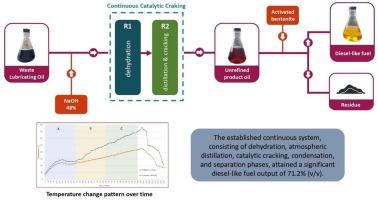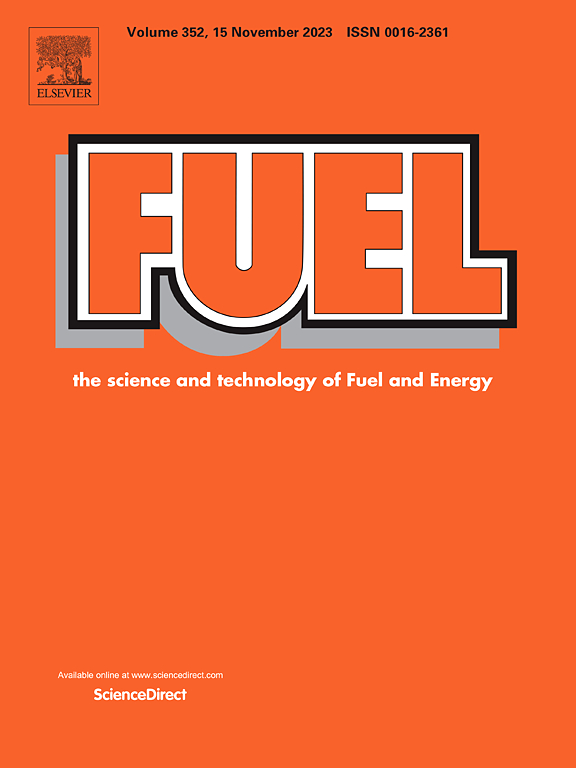Waste lubricating oil valorization via NaOH-Catalyzed Cracking: A resource recovery approach for cleaner fuel production
IF 7.5
1区 工程技术
Q2 ENERGY & FUELS
引用次数: 0
Abstract
Waste lubricating oil (WLO), an environmental hazard yet a recoverable resource, was converted to diesel-like fuel using continuous catalytic cracking with 48 % (w/w) NaOH as a base catalyst, differing from conventional acid-catalyzed methods. Post-treatment with activated bentonite effectively removed residual water, polar impurities, and color. The system—involving dehydration, atmospheric distillation, catalytic cracking (300–350 °C), condensation, and separation—achieved a 71.2 % (v/v) fuel yield. Reactor thermal profiling revealed distinct heating/dehydration, minor hydrocarbon cracking, and diesel-range hydrocarbon production zones. This approach shows significant promise for sustainable WLO valorization and reduced environmental impact. However, further fuel characterization (e.g., sulfur, cetane number) and process optimization are advised. This study advances sustainable WLO management and resource recovery within a circular economy.

废润滑油催化裂化增值:清洁燃料生产的资源回收途径
废润滑油(WLO)是一种环境危害但可回收的资源,与传统的酸催化方法不同,以48% (w/w)的NaOH为碱催化剂,采用连续催化裂化方法将其转化为类似柴油的燃料。后处理用活化膨润土有效去除残留水、极性杂质和颜色。该系统包括脱水、常压蒸馏、催化裂化(300-350°C)、冷凝和分离,实现了71.2% (v/v)的燃料收率。反应器热剖面显示出明显的加热/脱水、少量烃裂解和柴油烃生产区。这一方法显示了可持续的世界粮食组织价值增值和减少环境影响的巨大希望。然而,建议进一步的燃料表征(例如,硫,十六烷值)和工艺优化。这项研究促进了循环经济中可持续的WLO管理和资源回收。
本文章由计算机程序翻译,如有差异,请以英文原文为准。
求助全文
约1分钟内获得全文
求助全文
来源期刊

Fuel
工程技术-工程:化工
CiteScore
12.80
自引率
20.30%
发文量
3506
审稿时长
64 days
期刊介绍:
The exploration of energy sources remains a critical matter of study. For the past nine decades, fuel has consistently held the forefront in primary research efforts within the field of energy science. This area of investigation encompasses a wide range of subjects, with a particular emphasis on emerging concerns like environmental factors and pollution.
 求助内容:
求助内容: 应助结果提醒方式:
应助结果提醒方式:


